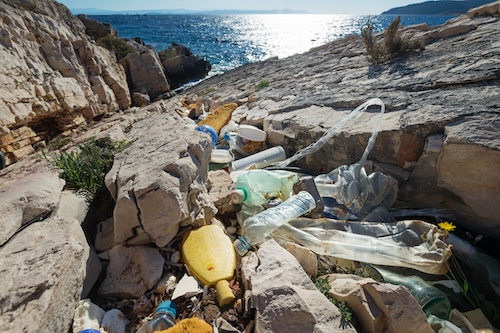The Mediterranean Sea is one of the most polluted seas in the world: it alone accounts for 5 to 10% of global plastic pollution, originating primarily from human activities.
A true environmental scourge, plastic is a threat to both aquatic ecosystems and our health, while also contributing dramatically to climate change.
To address this alarming situation and take concrete action, Surfrider Foundation, the Tara Ocean Foundation, the MAVA Foundation, and the Prince Albert II of Monaco Foundation launched the BeMed (Beyond Plastic Med) program in 2015. The objective of this initiative: to bring together a network of committed stakeholders to reduce plastic pollution in the Mediterranean through concrete and collaborative actions.
A Collaborative and Multi-Stakeholder Approach
From the outset, BeMed has established a dynamic of collaboration with numerous partners. Its founding members, including Surfrider Foundation, have contributed their scientific expertise, expanded the network, and developed innovative projects.
Present in 15 countries in the Mediterranean basin, BeMed relies on a broad network of committed local stakeholders, particularly civil society associations and experts, to deploy initiatives adapted to the specificities of each territory and, above all, to develop concrete solutions.
It is for this purpose that BeMed supports projects each year aimed at reducing single-use plastic and promoting source reduction as a priority, improving waste management, raising public awareness, collecting data, and finally mobilizing stakeholders in the development of new regulations.
To date, more than 110 projects, led by associations and field actors, have benefited from BeMed’s support through its annual micro-initiatives call and its specific calls for projects targeting islands in 2020 and 2024.
To strengthen this dynamic, BeMed has created the Community of Practice, a network of local actors aimed at driving a regional movement, facilitating the exchange of experiences and the sharing of best practices.
The involvement of the private sector through the Corporate College also reinforces the impact of the actions carried out, by promoting skills development through dialogue between businesses, scientists, and field actors.
The Corporate College: An Unprecedented Collaboration with the Private Sector
In 2020, BeMed launched its Corporate College, which involves about ten major companies. It is a space for dialogue and action for companies wishing to contribute to the reduction of plastic pollution in order to challenge them and develop more environmentally friendly solutions.
This College aims to mobilize companies at different levels of the plastic value chain to develop concrete solutions adapted to local contexts.
This collective benefits from the expertise of a scientific committee composed of 12 scientists.
Ten Years of Commitment and Impact for a Plastic-Free Mediterranean: Major Accomplishments
📈 A Sustainable Source of Funding
BeMed has supported 113 projects in 15 countries through 10 calls for projects launched since 2015, becoming a pillar of funding for local initiatives.
In 2020 and 2024, specific calls targeting Mediterranean islands strengthened the preservation of these sensitive areas.
🏨 Commitment from the Tourism Sector
A pilot project launched in 2022 with the InterContinental Marseille – Hôtel Dieu demonstrated that it is possible to reduce single-use plastics without impacting service quality. A similar project was launched in Tunisia, at La Badira hotel.
To amplify this impact, BeMed has developed a free practical guide and is launching a working group specifically for hotels in 2025.
✊ A Community of Committed Stakeholders
With 94 organizations supported, BeMed brings together an active network that shares experiences and best practices. Regular meetings allow work on common issues and strengthen synergies.
➕ The Launch of BeMed+
BeMed+ was launched in 2024. It is a project aimed at consolidating the actions carried out over the past 10 years and includes a component of pilot projects in two target areas:
- Monastir, Tunisia
- Shkumbin River Basin, Albania
Conducted in partnership with Surfrider Foundation Europe, IUCN, INCA (Albania), and Notre Grand Bleu (Tunisia), this program is based on in-depth field studies to identify sources of plastic pollution and co-construct solutions adapted to local needs.
Ten years after its launch, BeMed has established itself as a key player in the fight against plastic pollution in the Mediterranean. Thanks to its multi-stakeholder collaboration model, its network of experts, and its approach adapted to local specificities, BeMed continues to deploy effective and sustainable solutions. The commitment of businesses, associations, citizens, and political decision-makers remains essential to achieving the goal of a plastic-free Mediterranean.
In Summary
Since its creation, BeMed has focused its action on three priority areas:
- Supporting concrete projects: by providing funding to associations and field actors, BeMed promotes the development of effective and replicable solutions throughout the region. Since 2015, 113 projects have been launched in 15 countries.
- Facilitating the coordination of initiatives: by collaborating with businesses and local stakeholders, BeMed acts as a catalyst for the launch and implementation of projects aimed at reducing plastic consumption.
- Building and strengthening synergies: through its Community of Practice and its Corporate College, BeMed promotes interconnection between committed actors, thus facilitating the sharing of experiences, the dissemination of best practices, and their implementation on a larger scale.
KEY FIGURES
- €4 million invested since its creation
- 113 projects supported
- 94 organizations supported
- 15 countries involved

